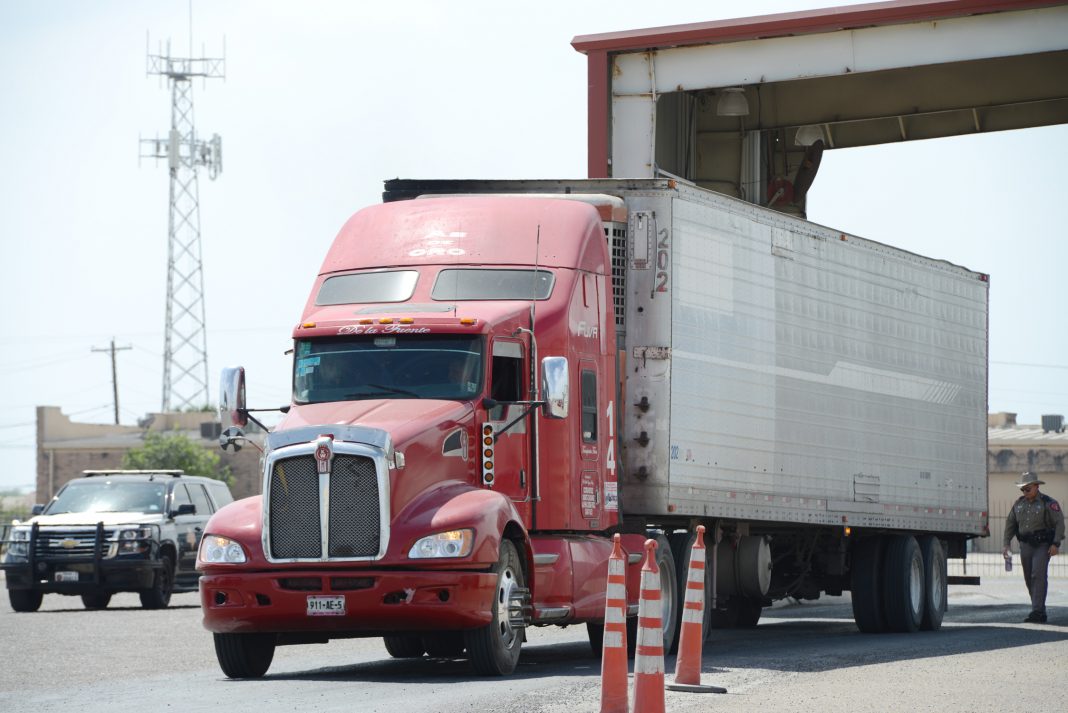As of late Thursday, roughly 80 percent of commercial truck traffic inbound to Texas from Mexico was still subject to Gov. Greg Abbott’s order requiring the Department of Public Safety to conduct “enhanced inspections” of every northbound truck attempting to cross the border.
According to Dante Galeazzi, president and CEO of the Texas International Produce Association, the result of Abbott’s expansion of “Operation Lone Star,” announced April 6, is millions of dollars in lost and unrecoverable economic impact for the state. Galeazzi said in an April 13 phone interview that losses between April 8-12 likely totaled around $114 million worth of produce left in Mexico and $115 million worth of economic production for the state of Texas.
“It’s not like somewhere down the road we’ll grow more produce and people will eat more of it in the same calendar year,” he said. “That’s not how it works. We are not going to get that money back. We’re not going to get that economic impact back.”
TIPA represents growers and other produce-related businesses on both sides of the border, though much of that loss will be absorbed by importers and other Texas-based companies, Galeazzi said, noting that “this is absolutely detrimental for us.”
Abbott announced the new policy in response to the Biden administration’s April 1 announcement that as of May 23 it was lifting Title 42, invoked by the Trump administration during the pandemic to expel migrants and asylum seekers from the U.S. border without hearing their asylum claims.
The Centers for Disease Control and Prevention said Title 42 is no longer needed “considering current public health conditions and an increased availability of tools to fight COVID-19.”
Abbott said the enhanced inspections are necessary because Mexican cartels use northbound commercial trucks to smuggle drugs and undocumented migrants. But Galeazzi noted that the additional level-one inspections being conducted by DPS focus on equipment — lights, mirrors, windshield wipers, etc. — and not onboard cargo. Each inspection takes about 45 minutes, he said.
“Those safety inspections do not permit DPS to open the trailers, at least as I understand it,” he said. “What they’re focusing on is the condition and safety of the vehicle and its driver. We, at least from the produce side, have not heard that these inspections yielded any finds of either undocumented migrants or contraband.”
Also, the importation of produce already entails inspections by DPS and four other governmental entities: U.S. Customs and Border Protection, U.S. Department of Agriculture, U.S. Department of Transportation and the U.S. Food and Drug Administration, Galeazzi said.
“The difference is they’re conducting inspections on somewhere between 20 to 40 percent of the traffic that’s coming through,” he said. “It just depends on what’s involved with the cargo and the condition of those inspections.”
Requiring an additional 45-minute inspection on top of the other inspections Galeazzi deemed “excessive.” The Pharr-Reynosa International Bridge, which normally crosses about 2,500 northbound commercial trucks a day, crossed slightly over 150 trucks the Friday after Abbott imposed the new rule, Galeazzi said.
Following intense criticism of the new policy from Democrats and Republicans alike — even from his own agriculture commissioner — Abbott announced on April 13 that he was ending enhanced inspections for trucks coming through Laredo after reaching an agreement with the governor of Nuevo Leon, one of four Mexican states bordering Texas. Laredo accounts for about 20 percent of the fresh produce brought in from Mexico.
“That’s means there’s still 80 percent of that movement that’s being impacted,” Galeazzi said. “What I can tell you is that from the perspective of fresh produce, we have got to have a solution quickly. This product gets planted anywhere from 45 to 120 days prior to it showing up here, so you’re talking about months and months of investment, of capital resources dedicated to this produce, and it’s not like we can just turn the faucet off.”
Some growers, especially growers of highly perishable leafy greens, are already being forced to plow their crops under because they can’t get them onto trucks, he said.
Texas normally crosses 320,000 loads, or 1.28 billion pounds, of fresh produce from Mexico each year, with about 70 percent of that going out of state, most to the East Coast and Midwest, but some to the West Coast and Canada, he said. While consumers in Texas and elsewhere aren’t likely to see higher prices immediately because of Abbott’s policy, they can expect soon to see shelves devoid of certain items that only come from Mexico this time of year, items such as avocados, tomatoes, limes and mangoes, Galeazzi said.
Meanwhile, the economic losses mount exponentially each day the enhanced inspection order continues, he said, adding that TIPA is hoping for “an amicable solution to move this forward and solve it as quickly as possible.”
“TIPA very much supports border security, because we also represent Texas farmers who farm on or near the river, and so they’ve been subject to that activity,” Galeazzi said. “But what we’re not OK with is … punishing the legitimate, Texas-based trade, because at that point now what you’re doing is you are punishing the good guys to go get to the bad guys.”





